WAR CRY



Archers prequel joins in with 80th anniversary commemorations of VE Day

The Salvation Army is a Christian church and registered charity seeking to share the good news of Jesus and nurture committed followers of him. We also serve people without discrimination, care for creation and seek justice and reconciliation. We offer practical support and services in more than 700 centres throughout the UK. Go to salvationarmy.org.uk/find-a-church to find your nearest centre.
The Salvation Army first published a newspaper called the War Cry in London in December 1879, and we have continued to appear every week since then. Our name refers to our battle for people’s hearts and souls as we promote the positive impact of the Christian faith and The Salvation Army’s fight for greater social justice.
Editor: Andrew Stone, Major
Deputy Editor: Philip Halcrow
Staff
Staff
Staff
Editorial
Graphic
Emily Bright
Claire Brine
Ewan Hall
Linda McTurk
Mark Knight
Graphic Designer: Natalie Adkins
Email: warcry@salvationarmy.org.uk
The Salvation Army
United Kingdom and Ireland Territory 1 Champion Park London SE5 8FJ
Tel: 0845 634 0101
Subscriptions: 01933 445445 (option 1, option 1) or email: subscriptions@satcol.org
Founders: William and Catherine Booth
International leaders: General Lyndon Buckingham and Commissioner Bronwyn Buckingham
Territorial leaders: Commissioners Jenine and Paul Main
Editor-in-Chief: Major Julian Watchorn
Whether it’s the rate of inflation, taxes, economic growth or tariffs, finance has never been far from the news headlines in the past few months. Cost of living challenges have also brought money to the forefront of people’s personal concerns.
Finance is also prominent in Nikki Fenton’s professional life. As we discover in this week’s War Cry, Nikki is the CEO of Reliance Bank, which is owned by The Salvation Army.
In the feature, Nikki explains that the fact the bank is owned by a church was important to her when she decided to join.
‘It does make the bank unique,’ she says. ‘As you can imagine, it is unusual to open board meetings with prayer in the banking industry!’
She believes that Reliance Bank is ‘an unsung hero’ as ‘a small bank striving to do the right thing in a complex environment of regulation and rapid evolution of digitalisation’.
It may seem strange to find that a church owns a bank. But the truth is that God is interested in everything that goes on in his world – including its finances.
God wants to be involved in all that we go through or experience. His love for us extends to the most everyday tasks we carry out, such as managing our money or putting food on the table. He cares if we are struggling to cope in these areas and is concerned about any other worries that we may have.
Whatever may be taxing us at the moment and causing our rate of stress to increase, if we’ll ask him and follow his direction in our lives, God can help us. We can bank on it.


local Salvation Army centre


Radio preview: Victory at Ambridge Sundays
Radio 4 and BBC Sounds
By Claire Brine
As the UK prepares to mark the 80th anniversary of VE Day (8 May), Radio 4 listeners are being invited to step back in time in Victory at Ambridge. The two-part audio drama – which begins on Sunday (4 May) – transports fans of the long-running serial The Archers to the fictional Borsetshire village during the Second World War.
Set six years before The Archers began in 1951, Victory at Ambridge explores how the villagers are keeping calm and carrying on in the 12 months leading up to VE Day in 1945. There are births, deaths, romances, rivalries – and disagreements in the Women’s Institute. The drama also unearths a series of puzzling prophecies for the wartime villagers after an 18th-century grotto in the grounds of Lower Loxley stately home is excavated.
While listeners get to know more about 1940s Ambridge and how it became the village it is today, the early lives of some of the serial’s best-loved characters are fleshed out and explored – including that of Peggy Archer, who went on to become Peggy Woolley, a role played by actress June Spencer for more than 70 years.
As a pregnant woman living in a bombstricken London while her husband is away at war, Peggy (Emerald O’Hanrahan) knows that her life is at great risk. Worried for her safety, her parents-in-law, Dan (Timothy Bentinck) and Doris Archer (Felicity Finch) consider inviting her to come and live with them in Ambridge. But how will a city girl like Peggy cope with life in the sticks?
Adapting to wartime life also presents challenges for the other villagers. Bob Little (Ryan Kelly), who runs local pub The Bull, is grieving the death of his son in action, and
local scoundrel Walter Gabriel (Nick Barber) has his hands busy trying to ensure that there’s a thriving black market scene.
Reflecting on the variety of the drama’s storylines, BBC producer Kim Greengrass describes Victory at Ambridge as a ‘hidden history’, explaining that it’s a ‘heartfelt tribute to resilience, community and the trials and tribulations of everyday life during World War Two’.
Fast-forward to the present, and it’s likely that many of us have parts of our history that we choose to keep hidden. Perhaps there are stories from our past that we find painful to talk about – so we don’t. Maybe we fear how our loved ones would react if they discovered what we were really like, so we choose to carry our shame in silence instead.
When weighed down with burdens that
The Old Bull in Inkberrow, said to be the inspiration for The Bull, a scene of much drama over the years in ‘The Archers’
we feel we can’t tell anyone about, we can talk to God. The Bible tells us that, when we turn to him and confess what’s on our mind, his arms are always open.
An early follower of Jesus, Peter, who experienced times of failure and shame before receiving God’s forgiveness, said: ‘Since God cares for you, let him carry all your burdens and worries’ (1 Peter 5:7 The Voice).
Whatever our history looks like –whatever we have said or done that we regret – God still loves us. He loves us so much that he wants to help us live a better life.
And when we allow him to begin to change our character, we can take a first step into a more peace-filled future.
Sounds good.
Some members of the ‘Victory at Ambridge’ cast


Sarah Olowofoyeku gives her take on a story that has caught the attention of War Cry reporters
Inmates at HMP Oakwood in Featherstone, Staffordshire, can now do a weekly shop at an in-prison branch of Iceland, newspapers have reported. It’s the first shop of its kind in Britain, and is designed to help prisoners adjust to the outside world on their release.
The inmates are given Monopoly-style money, earned through good behaviour, which they can use to buy groceries, including branded products that they can’t get on the prison wings.
And the store also offers what money can’t buy – employment opportunities for prisoners nearing the end of their sentences.
I don’t have to earn my second chance
Ellen Herickx, Iceland’s employment lead manager, told The Times: ‘A lot of prisoners, when they come into prison, think, “Who’s going to employ me? I’m in prison. That’s it, that’s the end of my life because nobody will take me on.” So when they get that opportunity, that second chance, they grasp it with both hands.
‘They’re less likely to reoffend … and they’re grateful because they didn’t expect another chance.’
Reading this article warmed my heart. It’s good news. I have a desire to see the prison system changed, and so I’m moved by this commitment to offering people a second chance. I’m also moved because it reminds me of my own life.
While I’ve not committed any crimes worth imprisonment by UK law, according to God’s law I have messed up countless times. But, because God loves me so much, he allowed Jesus to take the punishment in my place, and offered me a second chance at life.
When Jesus died on a cross, the price was paid for my mistakes of the past and of the future too. I don’t have to earn my second chance; it has already been given freely to me.
Whether we are guilty of offences according to the law or not, we have all told lies or been selfish or prideful, so we have all failed to live up to God’s standard. But we have also all been offered a second chance. We have simply to say sorry and take hold of the offer – it’s the best news.
After winning a bronze medal at the Diving World Cup Super Final in Mexico, Andrea Spendolini-Sirieix wrote on Instagram that she ‘gave God all the glory’.
The GB diver – who won bronze for the 10m platform event – posted that her Christian faith had helped her when she faced difficulties in the runup to the competition.
She said: ‘Prior to competing, my anxiety was through the roof and I felt almost paralysed with fear. Pulling out wasn’t an option, so I turned to the only thing that could help me through ... my faith.’
She added: ‘I was reminded that in my weakness, I have great strength because I lean all the more on God... This medal is more than just a medal. It’s a reminder that I can do all things through Christ that strengthens me.’

A Salvation Army emergency response vehicle was on site to provide refreshments during a recording of BBC1’s DIY SOS: The Big Build in southeast London.
Over the nine days of the build, 38 Salvation Army volunteers served drinks and snacks from the vehicle, which is usually deployed to support emergency services personnel when they deal with serious incidents.
The episode of the TV show is expected to be broadcast later in the year.
Pictured with programme presenter Nick Knowles are Salvation Army personnel (clockwise from back left) Megan Moore, Sue Atkins and Lieutenant Lesley Holland.
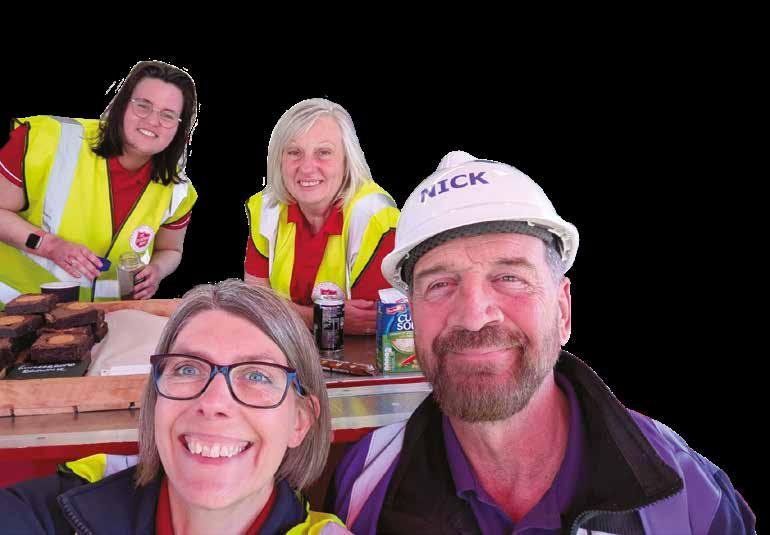
Harry Clark, a winner of the reality TV show The Traitors, told Radio Times that taking part in the BBC2 series Pilgrimage was his ‘saviour’.
Walking for 300km along an ancient Catholic pilgrimage route through the Austrian and Swiss Alps, Harry was part of a group of celebrities who – the article explained – ‘talked faith, the meaning of life, happiness, ageing and grief’.
Having been raised a Roman Catholic, Harry told the magazine that his participation in the programme had had spiritual significance for him, particularly after being ‘blasted into celebrity’ after winning The Traitors ‘I was saying to God, give me a sign and this came along,’ he said. ‘[It was] a sign to show that God is there, that I’m not alone.’

nA Salvation Army care home in Weston-superMare is to hold a 1960s-style disco for its residents.
Working in partnership with That Creative Thingy Wotsit – a specialist service that brings creative people into care settings – Dewdown House intends that the event will be a celebration of music and movement. It will include a disco ball, retro decorations and staff dressed in ’60s attire.
The party is one of many activities taking place that aim to bring joy and connection between the residents, staff and families.
A church-owned bank is making a difference and ‘giving money meaning’ through its ethical practices
Feature by Ewan Hall
Down an unassuming cobbled side road, just off where the monument to the Great Fire of London stands, is Faith House, where the Salvation Army-owned Reliance Bank is based.
When I visited the building, I was interested to find out how a bank owned by a church conducted its business and what it was like for its staff members to work there.
The bank – originally named simply the Salvation Army Bank –was established in 1890 to help the church and charity to buy properties. Renamed Reliance Bank in 1901, it adheres to ethical banking principles, supporting the management of the church’s finances, property and global money transfers.
However, the bank is not just for The Salvation Army. It also supports other organisations, providing business and charity current accounts and saving accounts and loans. It is not a high street bank, with branches. The bank

Reliance Bank’s headquarters
selects clients based on their positive approach to social impact. Customer exclusions are sectors and activities that do not fit with The Salvation Army’s values, eg those that have a negative impact on people and the planet.
Reliance Bank provides funding for a variety of Christian organisations – for example a church which received a loan to purchase and refurbish an old chapel in Melton Mowbray. Known as the Hope Centre, it provides services to people in need, including a food bank and drop-in centre, while also serving as a place for worship and prayer.
Reliance Bank also offers loans to charities and selected businesses that may be overlooked by high street banks. It identifies this as ‘Giving money meaning’. The bank focuses on making sure funding goes to the right people to help those who are in need and who have a viable plan for repayment.
To learn more about the work of Reliance Bank and its staff, I speak
with CEO Nikki Fenton.
‘I feel privileged to hold the position of the CEO at Reliance Bank,’ Nikki tells me. ‘I joined in 2020 having worked for other mutual and ethical financial institutions.
‘I choose to work for organisations which share my personal values.
Reliance Bank’s history, close connection to The Salvation Army and how it is “Giving money meaning” meant I believed that I would make a difference working for this bank.’
Nikki goes on to explain how her role contributes to the bank’s mission of positive social impact.
‘I think Reliance Bank is an unsung hero,’ she says, ‘a small bank striving to do the right thing in a complex environment of regulation and rapid evolution of digitalisation.
‘My role involves keeping that vision of Reliance Bank clear in our strategic and operational plans so that everyone is aligned, on the same path.’
Nikki also explains that the fact that

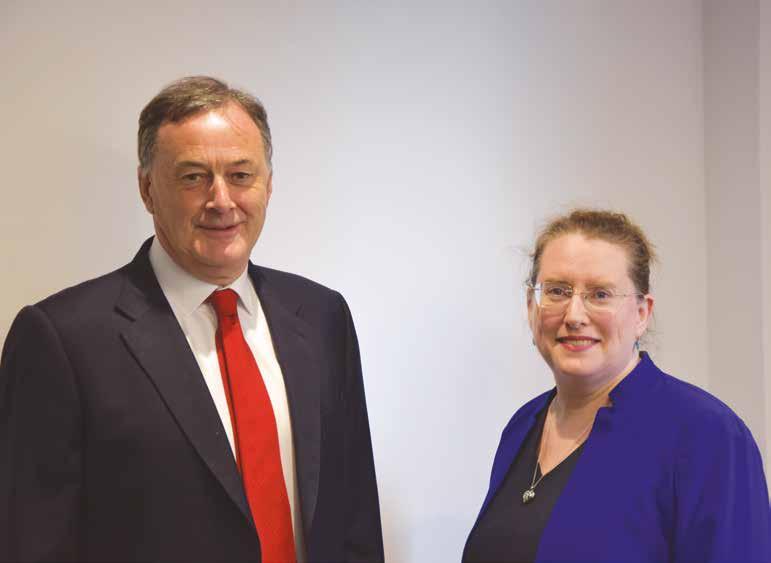
the bank is owned by The Salvation Army was important to her when she decided to join.
I would not have joined if it was not owned by The Salvation Army
‘I
t does make the bank unique,’ she says. ‘As you can imagine, it is unusual to open board meetings with prayer in the banking industry!
‘It is important to me, however, that the bank remains inclusive and attracts customers and staff of all faiths, recognising that The Salvation Army’s mission is to preach the gospel of Jesus Christ and to meet human needs in his name without discrimination.’
On my visit to the bank’s offices, I also speak to Jervis Rhodes, the chief risk officer for Reliance Bank, about whether the bank’s ethical
and Christian service influenced his decision to join.
‘Yes, it did,’ he says. ‘I would not have joined if it was not owned by The Salvation Army and aligned to the mission of The Salvation Army.’
We go on to discuss the opportunities that staff receive to explore their own faith while working at the bank.
‘Reliance Bank supports staff exploring their faith at work, and the work environment reflects a number of different faiths,’ says Jervis. ‘We have regular visits from a chaplain and in the last few years we have taken a group of employees to The Salvation Army’s Christmas concert at the Royal Albert Hall, which is a joyful celebration event.’
Jervis also tells me about a time when the bank’s values impacted its business decisions.
‘One of our church customers purchased a former retail building for conversion to their main place of
worship shortly before Covid,’ he says. ‘However, the income generated by the congregation fell significantly during the pandemic.
‘Income is only now starting to recover, but the local mission has continued despite the challenging times. The “commercial” approach would have been to reduce funding and increase our remuneration to reflect the higher risk. However, our values are to support those projects which are aligned with the work of The Salvation Army whilst also ensuring our shareholders are appropriately rewarded for their investment.’
Reflecting on my visit, I was impressed by how a church-owned bank can stick to its ethical principles and be successful. The staff’s dedication to both social impact and faith-based values create a unique and inclusive work environment for all. And it became clear to me how a mission-driven bank can make a difference for good.

‘I was asking, what was going on behind his eyes?’
While making the works of art in his latest exhibition, artist NIC FIDDIAN-GREEN found himself exploring the meaning of Jesus’ death
Sculptor Nic Fiddian-Green has carved out a niche for himself since the day when, as a young man, he saw the Parthenon Sculptures. The broken figures that greeted him at the British Museum captured his imagination and eventually led him to produce fragmentary sculptures of horses, which over the years have been installed in public spaces around the world and at racecourses such as Ascot and Goodwood.
But Nic has also created pieces focused on another ancient image. His depictions of Jesus before and after his crucifixion are currently on display at a gallery off London’s Piccadilly. And, though the subject matter is not equine, Nic has a horse in this race.
When we meet at Chelsea Arts Club a few weeks before his exhibition The Face of Christ is installed across town, Nic explains that the show is centred on a sculpture of the Crucifixion, titled I Accepted, that prompted him to ask himself questions about his faith.
‘When I set about the work –which was originally commissioned for a private chapel – I suppose fundamentally it was about me entering into the mystery of Christ in his last hour and asking the question, what was really going on for him? Then I began to ask, what was really going on for me?
‘Through the work, which took quite a long time, I started to question myself.
‘I was not really conscious of what I was trying to do when I was working on it – I was just allowing myself to enter into the question of Christ. He is dying and looking down from the cross. The piece was designed to be hung about a metre off the ground, and I wanted his eyes to meet those of the people who

Turn to page 10 f
may stand before it. I wanted the figure to engage with the audience. I was allowing whatever happened to happen.
‘And what happened – what the work was about – was only made known to me at the point where it was near completion, when I asked members of the public passing by to come into my workshop. I put the question to them: “What is it that you see when you stand before this piece?”
‘The answer I got 99 per cent of the time was the word “acceptance” – which for me is a big principle.
‘So it was kind of revealed to me that the piece is about the complexities of a life of suffering. Christ gave himself up in the most agonising of deaths for
the sake of humanity – the Resurrection is still to come – and I suppose in my journey I have this question: am I doing God’s will or am I still doing my will?’
My fascination is something to do with the imperfect
Over the years, Nic’s representations of Jesus have shared some similarities with those Parthenoninfluenced horses with which he made his name. His fascination with ‘the broken object’ could be seen when
people entered Southwark Cathedral in the run-up to Easter in 2013, where Christ Rests in Peace depicted the head of Jesus after he had been placed in his tomb. Nic’s interest is also on display in the fragmentary pieces which serve as off-shoots from the centrepiece Crucifixion in the present exhibition.
‘My interest started with the Elgin Marbles,’ he says. ‘They’re broken. The horse’s head became fragmented – just a head. My fascination is something to do with the imperfect and the imperfectly perfect.
‘As an artist, I am a perfectionist – many of us are. We try to perfect something. We obsess, we balance, we control. But to me, fragments, relics of the past, are as beautiful as the perfect object that we seem to revere today. People talk about the perfect world – there isn’t a perfect world.

‘So I broke up my image of Christ – I broke the body off, I broke the arms off. There’s a piece which is just a broken chest.’
Not all breaks were planned. Nic says that he ‘almost inevitably managed to knock off 4 thorns from the 36’ which he had made for one crown of thorns in Carrara marble. ‘But,’ he adds, ‘I guess a few got broken off Jesus’ crown of thorns along the way.’ He interprets an unplanned crack that appeared in the bronze of Jesus looking down from the cross as ‘a great wound’.
‘We all know what wounds are,’ he says. ‘I’ve yet to meet somebody who has no wounds.
‘I’m a thinking, searching, questioning, troubled person. I suffer all the isms of life’s tapestry. I veer between the highs and lows. But I understand that Christ is asking us all to rest – to come to know that it will be OK.’
Nic says that, while working to depict Christ on the cross, he tried to avoid taking artistic shortcuts.
‘I was asking myself, could I learn something from this? Could I enter into that mystery?
‘I know how to make an

eye, and I know when I’m just doing it for the sake of it. But with this piece, I was asking, what was going on behind his eyes? Christ’s eyes have to be alive. They have to show something he’s going through, something deep within. And if he’s going through it, I’ve got to try to work out what he’s going through.
‘I’ll never know that, but I’ve got to use my imagination. I’ve also probably got to use my experience. I’ve had cancer three times in different places. I’ve nearly died. I’m a recovering alcoholic, so I know about addiction at its most despairing.
‘I’ve suffered enough to know that life
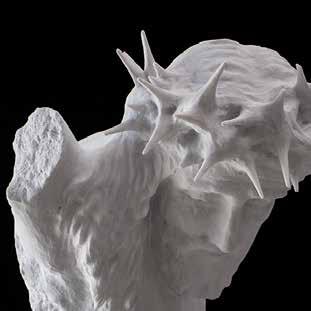
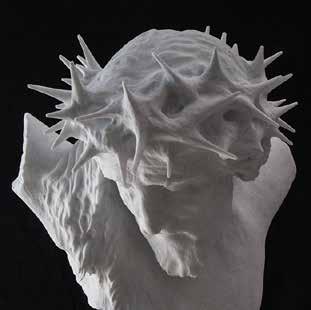
The artist’s fragmented sculptures of Christ
is a precious thing and that it’s fragile.
‘But a man dared to have himself nailed to a cross for me, for humanity, for those who are prepared to take something from his example. And I still have the belief that life is a journey worth making.’
Nic describes his work of ‘turning things into physical objects’ as ‘my way of sharing the journey’. He has been moved by the people he has met over his life ‘who have hope and conviction and courage’ and who make the world a good place.
He sees his latest work as representing a point along his own journey.
‘I suppose,’ he says, ‘my faith has always called me back to the truth, which is that we don’t need very much, and that we need to do what Christ told us. He said: “I have loved you, and your purpose is to look after each other.”
‘The human condition means that we will be born, we will live and we will die. We can’t get away from the facts, but there’s this bit in the middle that asks us the question, asks me the question: what are you going to do with it?’
l The Face of Christ is at the Sladmore Gallery, London SW1, until 9 May
Your prayers are requested for Dakota, who is having difficulty with housing and employment and is concerned about all those with similar needs; and for Stephen, who has advanced prostate cancer.
The War Cry invites readers to send in requests for prayer, including the first names of individuals and details of their circumstances, for publication. Send your Prayerlink requests to warcry@ salvationarmy.org.uk or to War Cry, 1 Champion Park, London SE5 8FJ. Mark your correspondence ‘Confidential’.
a Christian
There is no set formula to becoming a Christian, but many people have found saying this prayer to be a helpful first step to a relationship with God
Lord Jesus Christ,
I am truly sorry for the things I have done wrong in my life. Please forgive me. I now turn from everything that I know is wrong.
Thank you that you died on the cross for me so that I could be forgiven and set free.
Thank you that you offer me forgiveness and the gift of your Holy Spirit. Please come into my life by your Holy Spirit to be with me for ever.
Thank you, Lord Jesus. Amen

The Book of Nehemiah – like its predecessor Ezra – chronicles events that followed the Jews’ exile in Babylon. Nehemiah is cupbearer to Babylon’s King Artaxerxes. When he hears that the countrymen who returned to Jerusalem to rebuild the Temple are struggling to secure the city, he asks Artaxerxes for permission to go to rebuild the city walls. The king agrees (chapters 1 and 2).
Finding the walls and gates in ruins, Nehemiah organises the returnees into work parties and the rebuilding begins (chapter 3). Some of the neighbouring tribes feel threatened. Sanballat from Moab and Tobiah from Ammon (both in present-day Jordan) plot to attack Jerusalem. In response, Nehemiah organises an armed guard for the builders (chapter 4).
The people of Jerusalem are threatened on another front. There is famine, and the people are forced to mortgage their property to feed their families. Outraged, Nehemiah forces the moneylenders to repay the loans, and he instigates a frugal lifestyle for himself and the city’s leaders (chapter 5).
Sanballat and Tobiah continue the psychological pressure on Nehemiah. They threaten to tell Artaxerxes that Nehemiah is reinforcing Jersualem’s defences because he wants to proclaim himself king. Nehemiah is not goaded by their threats and the rebuilding programme is completed (chapter 6).
The city’s walls restored, the renewal of its citizens begins. Assembled together, the people of Jerusalem hear Ezra the priest read the Law of Moses, and they celebrate harvest with a feast (chapter 8).
A fast follows the feast. Ezra leads the people in a united act of confession for the sins that resulted in the loss of Jerusalem to the Babylonians some 100 years earlier (chapter 9).

Nehemiah, now governor of Jerusalem, and other leading citizens make a covenant to care for the upkeep of the Temple and ensure the smooth running of the priesthood (chapter 10). The call is then issued for exile returnees who resettled in other towns to repopulate Jerusalem (chapter 11).
To avoid the influence of other gods, particularly prevalent under King Solomon, Nehemiah banishes all those of foreign descent from Jerusalem, condemns marriage to foreigners and introduces Sabbath observance (chapter 13).

To receive basic reading about Christianity and information about The Salvation Army, complete this coupon and send it to
War Cry 1 Champion Park London SE5 8FJ
Address



Celebrations are about to mark the 80th anniversary of the end of the Second World War in Europe
Feature by Ewan Hall
On 8 May 1945, radios across Britain received an announcement: ‘The designated head of the German state signed the act of unconditional surrender of all German land, sea and air forces in Europe.’
Next week, 80 years later, celebrations will be held to mark the end of the Second World War in Europe and to remember those who sacrificed so much during the six years of a war that cost the lives of millions and destroyed countless homes and cities.
Straight after the announcement of Germany’s surrender, and learning that the next day was to be a national holiday, people began organising various events to celebrate the victory. Churches held thanksgiving services, while cities, towns and villages held parades and street parties, with singing and dancing which continued into the night.
The 80th anniversary of VE Day will reflect many of those events.
National commemorations in London will include a service of remembrance in Westminster Abbey, a concert on Horse Guards Parade featuring chart stars and military musicians, and a fly-past of modern and historic aircraft. Meanwhile, across the UK, neighbours will gather together for street parties.
Though the hardships, pain and sorrow of families across Britain and the rest of Europe will never be forgotten, VE Day symbolised the end of a brutal war – but it was also a time when new challenges of rebuilding the countries involved began.
Eighty years later we still face challenges in our country and in our individual lives, and often we find that when one problem ends a new one begins.
Which former MP presents BBC2’s Great British Railway Journeys? Who recently became the first woman to be elected president of the International Olympic Committee? 1 2 3 4 5 6
Who plays miner Steve in the film A Minecraft Movie?
What is the world’s tallest waterfall?
Who wrote the children’s book The Very Hungry Caterpillar?
Which car manufacturer produces the Fabia?
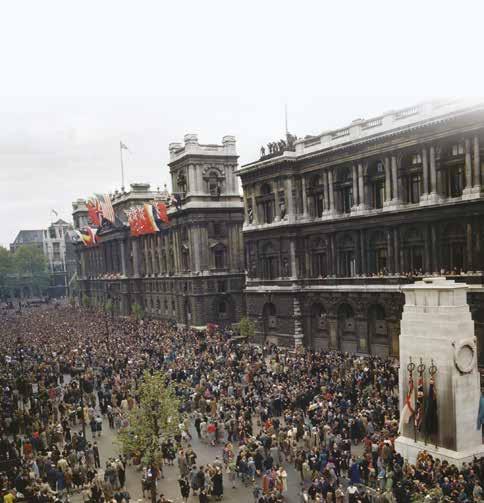
When they face a challenge in their day-to-day lives, Christians lean on God to help them get through it. They draw inspiration from one Bible passage in which the writer prays: ‘Even when I walk through the darkest valley, I fear no danger because you are with me’ (Psalm 23:4 Common English Bible).
If we choose to put our trust in God, he will provide us with the strength to keep going. Even when everything feels like a relentless struggle, he will be there to support us with his unconditional love.
1. Cry out (4)
3. Word of assent (3)
5. Resound (4)
7. Discerned (9)
9. Connection (4)
10. At hand (4)
11. Scatter (5)
14. Lorry (5)
15. Detested (5)
17. Likeness (5)
18. Group of singers (5)
19. Ventilated (5)
20. Rendezvous (5)
23. Servant (4)
25. Outfit (4)
27. Heated exchanges (9)
28. Dutch cheese (4)
29. Speck (3)
30. Corrosion (4)
DOWN
1. Ringlet (4)
2. Welsh emblem (4)
3. Pleasure craft (5)
4. Nimble (5)
5. Level (4)

6. Above (4)
7. Lung disease (9)

8. Adroit (9) 11. Female garment (5)
12. Prepared (5)
13. Cereal (5)
14. Nervous twitch (3)
16. Performed (3)
21. Circular (5)
22. Slumbered (5)
23. Species of swan (4)
24. Percussion instrument (4)
25. Mix (4)
26. Slant (4)


or
6. Afternoon nap

ACROSS: 1. Call. 3. Yea.
QUICK
DON’T LEAVE ME FIELDS OF GOLD HIPPY CHICK I’LL BE THERE KEEP THE FAITH LIVIN’ LA VIDA LOCA


300g brown rice
METHOD
Cook the rice according to the packet instructions and set aside.
1tbsp vegetable oil
1 large red onion, diced
2 garlic cloves, crushed
150g frozen peppers
1tsp ground coriander
1tsp ground cumin
1tsp smoked paprika
¼ tsp chilli flakes
2 x 400g cans green lentils, drained and rinsed
400g can red kidney beans, drained and rinsed
2 x 400g cans chopped tomatoes
Freshly ground black pepper
50g reduced-fat cheddar cheese, grated


2 medium eggs
300ml semiskimmed milk
100g rolled oats
1tsp baking powder
2 bananas, mashed
200g blackberries, frozen




Heat the oil in a large non-stick pan and cook the onion over a medium heat until it starts to soften. Add the garlic, peppers, coriander, cumin, smoked paprika and chilli flakes and cook for a further minute.
Add the lentils, kidney beans, tomatoes and black pepper and stir together. Put into an ovenproof dish and cook for 15 minutes, until the mixture is bubbling.
Remove from the oven and sprinkle over the cheese. Return to the oven for a further 5 minutes, until the cheese has melted.
Serve with the rice.

METHOD
Preheat the oven to 200C/Gas Mark 6.
Whisk the eggs and milk together in a small bowl with a fork until evenly mixed. Set aside.
Put the rolled oats and baking powder in a bowl and mix well together. Add the mashed bananas and frozen blackberries and mix again. Add the milk and egg mixture and combine thoroughly. Pour into an ovenproof dish and cook for 30-35 minutes, until cooked through.

Alternatively, to cook the dish in a microwave, mix all the ingredients as above. Divide the mixture between 4 microwaveable mugs, filling them about two thirds of the way up, then heat on high for 2 minutes and 30 seconds. If needed, continue to heat the mixture on high for another 15 seconds and repeat until cooked.
Serve immediately.

The Lord is compassionate AND MERCIFUL, slow to get angry AND FILLED WITH
Psalm 103:8 (New Living Translation) LOVE
